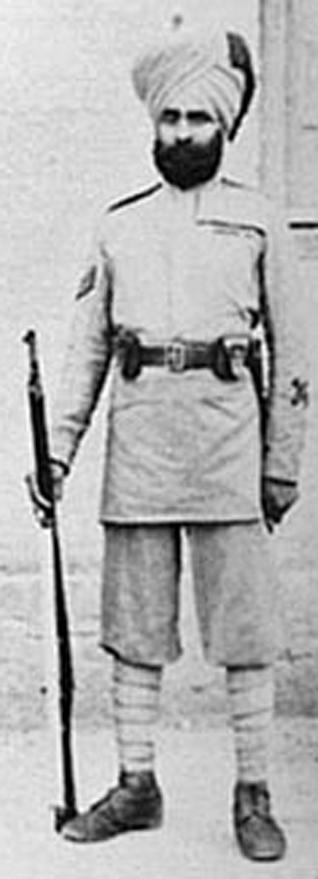Travel
Shanghai's Secret Gurdwara
by ANJU KAUR
Shanghai, China
In an affluent neighborhood on the outskirts of Shanghai, a Sikh family has set up a gurdwara on the top floor of their luxurious house.
The gated and guarded Western-style neighborhood is atypical of most in China where houses are rare and people rent or own small apartments. The residents of this neighborhood, about a 40-minute taxi ride from downtown, are foreign businessmen, as is the Sikh owner of this house. He and his family were traveling abroad when we visited on Friday, April 29, 2011. They had left a caretaker to look after the property.
The gurdwara was established about five years ago, the caretaker said. Approximately 100 people, mostly Sikh, but also Sindhi and Hindu, gather there during gurpurabs, and about 30 are there every Sunday, the caretaker said, on condition of anonymity. No one knows that there is a gurdwara here except for the local Sikhs and Indians, she said in Punjabi. "If the Chinese government found out, there will be a problem."
During the Cultural Revolution in 1966, religion was condemned as feudalistic, and those who practiced religion were persecuted. By the end of the revolution, a decade later, thousands of houses of worship were destroyed or converted for other use. But some of the big mosques and Buddhist temples that were built before the revolution are still standing today, especially in the big cities like Beijing and Shanghai.
Religion is more accepted now in China. Tour guides routinely talk about the minority Muslim population in China, and point to the mosques as they drive by. They also talk about how the Chinese adopted Buddhism from India. Buddhist temples are considered tourist sites where foreigners visit by the busload.
But worshipers still require permission from the government to hold services, the caretaker said. Perhaps in five years or so, the community will have raised enough money to ask the government for a permit to have a proper gurdwara building and hold services, she said.
The only other gurdwara in mainland China is located in Yiwu. [Hong Kong still has its historical gurdwaras.] And it is also the only gurdwara that is in a building dedicated to the purpose. Yiwu is a hub for foreign trading, whereas Shanghai is the preferred city for trading companies to have their headquarters. We did not have enough time to make the four-hour trip by train from Shanghai to Yiwu.
[Courtesy: SikhNN]
May 18 2011
Conversation about this article
1: Harminder Dhillon (London, United Kingdom), May 18, 2011, 10:46 AM.
Fascinating article. I'm always amazed at the enterprising nature of Sikhs and how signs of Sikhi can be found in the most remote and unlikely places. Great article!
2: I.J. Singh (New York, U.S.A.), May 18, 2011, 6:45 PM.
Excellent window to Sikhs in China. I wonder what is the history of Sikhs in that country. Were there many or any before WWII or during the heyday of Mao and Chou en Lai?
3: Kanwarjeet Singh Chadha (Franklin Park, New Jersey, U.S.A.), May 19, 2011, 2:01 AM.
I.J Singh ji: prior to India's independence, Sikh soldiers were brought into China by the British to control the Chinese population (see Opium Wars of the late 1800s). Sikhs were part of the Shanghai police and wore red uniforms. There were a few Sikh gurdwaras in Shanghai till the mid 1900s but these were later closed as the Sikhs left China.
4: Kanwarjeet Singh (Franklin Park, New Jersey, U.S.A.), May 19, 2011, 2:50 AM.
May I direct your attention to http://streetsofshanghai.pbworks.com/w/page/18638703/SMP - it includes the following: SIKH POLICEMEN - "One of the most distinctive Shanghai sights is that of an orange-turbaned Sikh officer on patrol or directing traffic, or on horseback as part of the Mounted Branch. Tall and imposing, the Sikhs are often thought to be more reliable than the Chinese, and form a useful military reserve. There are nearly 400 Sikh officers in the SMP (Shanghai Municipal Police). The first Sikh recruits joined the force in 1884. The SMP often liaises with the British Indian army's military experts and recruiters. However, despite recruiting with the army's advice, the SMP still finds trouble with Indian nationalism. The Special Branch has an Indian Section which collaborates with Indian government agents in keeping tabs on Indian nationalist activity. Another characteristic of the SMP's Sikh officers is that many moonlight as moneylenders – a white officer with expensive tastes can always get a loan from his Sikh subordinates, though he runs the risk of dismissal if he is found out."
5: N.S. Dhesi (United Kingdom), May 20, 2011, 12:47 PM.
Currently I am compiling a book called "The Sikh Soldier: Policing the Empire", and have included the following on Shanghai Municipal Police: Shanghai International Settlement was created in 1854 to serve the British, French and American foreign concessions in Shanghai, China. In 1863, the British and American concessions formally united to become the Shanghai International Settlement. As more foreign powers entered into treaty relations with China, their nationals also became part of the administration of the settlement, even though it always remained a predominantly British affair. The Shanghai International Settlement always remained Chinese sovereign territory. The Shanghai Municipal Police brought order to the bustling activity of the International Settlement. Dating back to 1854, the Shanghai Municipal Police had grown from a small complement of Britons recruited from the Hong Kong police into a large ethnically diverse force. The Sikh Branch recruited in 1884 from officers who had retired or left from Sikh military detachments in China, reached about 800 men. They were very effective in keeping the generally lawless elements of the population, under effective control and in the prevention of rioting and mob violence within the International Settlement. In 1927 the cause for alarm stemmed from the threat that the Chinese Nationalists would seize Shanghai and endanger the foreign residents there. The Mounted section of the Sikh Police was mobilized to patrol the limits of the International Settlement. Shanghai was once again threatened in early 1932 after hostilities broke out between the Chinese and the Japanese. The fighting became so intense that the Sikh Mounted Contingent and the American 4TH Marines manned the barricades of the International Settlement. The 1937 situation developed into a series of potentially explosive crises as both sides resorted to aerial bombing with considerable carelessness and accompanying indiscriminate antiaircraft and artillery fire. Again Sikh reinforcements were rushed in to support the 4th Marines. The 4th Marines was withdrawn early in 1938 when a shift of the scene of Sino-Japanese hostilities left Shanghai relatively safe. The Shanghai Municipal Police was disbanded in 1943, when the settlement was retroceded to Chinese control. In the decades that followed the founding of the People's Republic of China, the country's Sikh population virtually slowly disappeared. "The Sikh is the figure above all others who today represents the treaty port period in Shanghai's popular memory. They formed a surrogate military reserve for the Shanghai Municipal Council. Tall and imposing, the Sikh added a touch of imperial authenticity to the squatter settlement." (Bickers, Empire made Me, Penguin books, 2003). One of the most novel and interesting organizations in China under the supervision of the Provost Marshal was the Auxiliary Military Police Battalion. The Battalion was formed in Shanghai on 1 November, 1945. The organization at that time was composed principally of Sikhs. The Sikhs, with their colourful turbans and black beards, lent dignity to an otherwise drab occasion. This Battalion was used to supplement American troops who were engaged in protecting United States property. The outfit was clothed in U.S. Army uniforms, using a Geneva insignia on the left sleeve and the name of the AMP on the shoulder. The system of the rank was the same as the Army and the insignia is worn on the right sleeve. Auxiliary Military Police Battalion deactivated in 1949. I would be keen to hear from others who share my interest in this aspect of Sikh history. Please feel free to contact me on: nindi_singh2000@yahoo.co.uk
6: Apinder Singh Ghura (United Kingdom), May 21, 2011, 11:57 AM.
If Waheguru allows me to visit Shanghai again, I'd love to visit and do some kirtan there. Can any bhen or veer tell me the address or an email address so that I can find this gurdwara in Shanghai?
7: Meena Vathyam (China), May 24, 2011, 6:03 AM.
I am here on a short stay in Shanghai - there is a makeshift gurdwara here - a British building allotted to the Sikh Force of the Shanghai Municipal Police which doubled as quarters and a gurdwara. Unfortunately it is not in a great condition right now.
8: Ravindra Chahal (Fresno, California, U.S.A.), February 11, 2012, 10:09 PM.
Good article.
9: Shweta (Shanghai, China), March 08, 2013, 1:12 AM.
I'm an Indian visiting Shanghai and would like to visit the gurdwara. Could you please let me know the address?
10: Inderpal Singh (China), January 28, 2014, 10:23 PM.
Can someone please let me know the gurdwara address as I am living in Yangzhou?
11: M P Singh (India), March 04, 2014, 4:42 AM.
Pleased to note that we still preserve our faith everywhere, even in mainland China where they usually frown on Indians. Confident that with the grace of Almighty it would become a full fledged gurdwara.
12: M S Narang (Jaipur, Rajasthan, India), May 16, 2014, 6:02 AM.
i'm planning (along with my wife) to visit Shanghai for 5 days with 2-3 days in Beijing and vicinity. I want to know about the gurdwaras and local Sikhs in the two areas with a view to either stay at the Gurdwara or nearby so that I may have daily Guru Granth Sahib darshan.
13: Kamaljeet Singh Vijan (Mumbai, India), May 18, 2014, 11:46 PM.
I am so very happy and delighted to have come across this site. It gives me immense pleasure in reading about the Gurdwara and the various comments by our veers and bhen. I am on a business trip to Yiwu, China. I would feel thoroughly blessed if I get an opportunity to visit the gurdwara here. I will also be travelling to Shanghai this week.
14: Ravinder Singh (Delhi, India), October 07, 2015, 5:37 AM.
For Yiwu Gurdwara Sahib details, please contact the following persons when you are in Yiwu. 1) Manor Singh: +8618657933693. 2) Gurmeet Singh: +8613516892523. 3) Mahesh Ratra: +8615268603700. Address: FUTIAN DISTRICT 3, BUILDING 63, UNIT 1, SECOND FLOOR #201.





